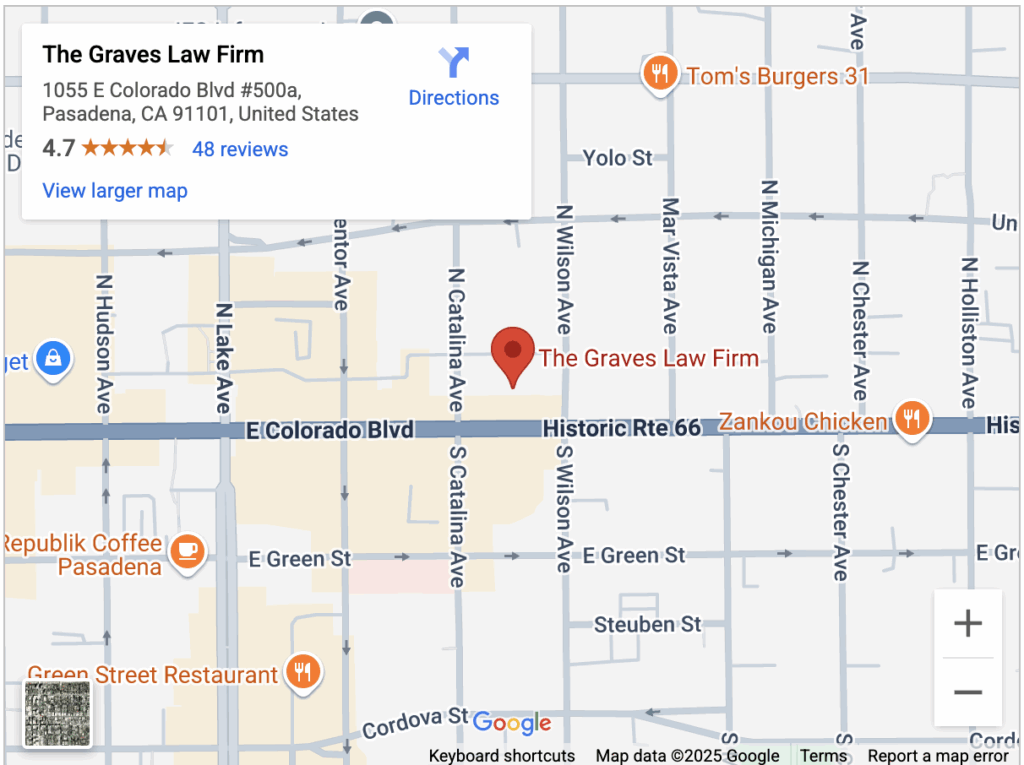
Dividing assets and debts during a divorce in Pasadena is stressful, but you don’t have to navigate it alone. Our team at The Graves Law Firm is dedicated to protecting your rights. Contact us online or call our law office at (626) 365-1037 for a confidential consultation with our Pasadena property division lawyers.
Our law firm has been helping clients resolve complex family law disputes for two decades. We understand how property division impacts your financial future, your living situation, and even your ability to move forward with your life. Let us walk you through the complexities of California’s property division laws and advocate for your best interests. Reach out to us today for assistance.
How The Graves Law Firm Can Help With Your Property Division Case in Pasadena, California

At The Graves Law Firm, we know that property division isn’t just about numbers—it’s about securing a fair outcome that allows you to move forward. Our firm has helped countless clients navigate the division of assets and debts during divorce. With 20 years of experience, we have the knowledge and resources to handle even the most complex property disputes.
When you hire a Pasadena family and divorce lawyer from our law firm, we will:
- Identify and classify assets as community or separate property
- Assess the value of marital assets, including real estate, investments, and retirement accounts
- Negotiate with your spouse’s legal team to reach a fair settlement
- Advocate for your rights in court if litigation becomes necessary
- Work to ensure that marital debts are divided fairly
- Protect your interests regarding high-value assets, such as business ownership and real estate investments
- Assist in navigating tax implications related to property division
Property division can have a lasting impact on your financial stability. Let our team at The Graves Law Firm help you fight for a fair resolution. Contact us today in Pasadena, CA, for a consultation.
What is Considered Marital Property in California?
California is a community property state, which means that most assets and debts acquired during a marriage are considered jointly owned by both spouses. This generally includes:
- Income earned by either spouse during the marriage
- Real estate purchased while married
- Vehicles, furniture, and other personal property acquired during the marriage
- Retirement accounts and pensions accumulated during the marriage
- Business interests developed during the marriage
In a divorce, community property is generally divided equally (50/50) between spouses, regardless of who contributed more financially (with only some exceptions). This approach is intended to create a fair and balanced division of assets, ensuring that both spouses walk away with an equal share of the marital estate.
What Is Separate Property?
Not all assets fall under community property laws. Separate property, such as inheritances, gifts received by one spouse, and property owned before marriage, is generally not subject to division. That said, disputes can arise when separate property becomes commingled with marital assets, such as when an inheritance is deposited into a joint bank account.
A skilled attorney can help clarify what assets should be divided and which should remain separate. California Family Code § 770 defines separate property in the state.
How Marital Debts Are Handled
Just as California law divides assets between spouses, it also requires a fair division of marital debts. This generally includes:
- Mortgage and home equity loans
- Credit card balances accumulated during the marriage
- Auto loans
- Student loans (if taken out during the marriage)
Debts are typically split 50/50 unless one spouse can prove that the debt was acquired solely for the benefit of the other spouse or outside the scope of the marriage. An experienced lawyer can help ensure that debts are fairly allocated.
The Family Home and Personal Property
One of the most emotional aspects of property division is determining what happens to the family home. In many cases, spouses either sell the home and divide the proceeds, or one spouse buys out the other’s interest. Courts may also consider who has primary custody of children when deciding who gets to remain in the home.
Personal property, such as furniture, jewelry, and vehicles, is usually divided through negotiation or court rulings. Sentimental items, like family heirlooms, can lead to disputes, so having legal representation is crucial. If an agreement cannot be reached, a court may order the sale of certain assets to distribute their value fairly.
Factors Considered in Pasadena Property Division Cases
While community property is generally split equally, courts can consider additional factors when making final decisions, such as:
- Each spouse’s earning capacity and financial needs: If one spouse earns significantly more than the other or has limited employment opportunities, the court may adjust the property division to ensure financial fairness.
- The length of the marriage: Longer marriages often result in more intertwined finances, making property division more complex. In contrast, shorter marriages may involve fewer shared assets.
- Contributions to the other spouse’s education or career: If one spouse supported the other through school or helped build a business, the court may consider this when distributing assets.
- Child custody arrangements: Courts may prioritize keeping the primary custodial parent in the family home to provide stability for the children.
- Whether one spouse attempted to hide or waste assets: If a spouse intentionally depleted marital assets through reckless spending, gambling, or hiding money, the court may adjust the division to compensate the other spouse.
- Any prenuptial or postnuptial agreements in place: Legally binding agreements outlining property division terms can significantly impact how assets are distributed.
These factors can influence the outcome of property division, making it essential to have an attorney who will advocate for your best interests.
Alimony and Its Role in Property Division
In some divorces, one spouse may be entitled to spousal support (alimony). Alimony is separate from property division but often plays a role in negotiations. Courts consider factors such as:
- The length of the marriage
- Each spouse’s earning capacity
- Contributions to the household or the other spouse’s career
- Standard of living during the marriage
Alimony can impact how property is divided, particularly when one spouse relies on financial support from the other. Having an attorney who understands these nuances is crucial to securing a fair outcome.
Alternatives to Courtroom Litigation
While property division disputes can be contentious, litigation isn’t always necessary. Many couples choose alternative dispute resolution methods, such as mediation or collaborative divorce, to negotiate fair settlements outside of court. These approaches can save time, reduce legal fees, and lead to more amicable outcomes.
Mediation
Mediation allows both spouses to work with a neutral third party to reach an agreement. This process is often less stressful and more cost-effective than going to court. Mediation gives both parties control over the outcome rather than leaving it in the hands of a judge.
Collaborative Divorce
In a collaborative divorce, each spouse hires an attorney trained in negotiation and conflict resolution. This method encourages open communication and compromise while avoiding the adversarial nature of court battles. However, if an agreement cannot be reached, both spouses must hire new attorneys and take the case to court.
Litigation
While alternative methods work for many couples, some cases require litigation—especially when dealing with high-value assets, business ownership, or hidden financial information. If negotiations fail, a judge will make the final decision based on California’s property division laws.
Contact Our Pasadena Property Division Attorneys for a Consultation
If you are facing property division issues in Pasadena, California, The Graves Law Firm is here to guide you through the process. With 20 years of experience, we have the knowledge and dedication to help you secure a fair and favorable outcome.
Contact our Pasadena property division attorneys today to schedule a consultation and take the first step toward protecting your financial future.

